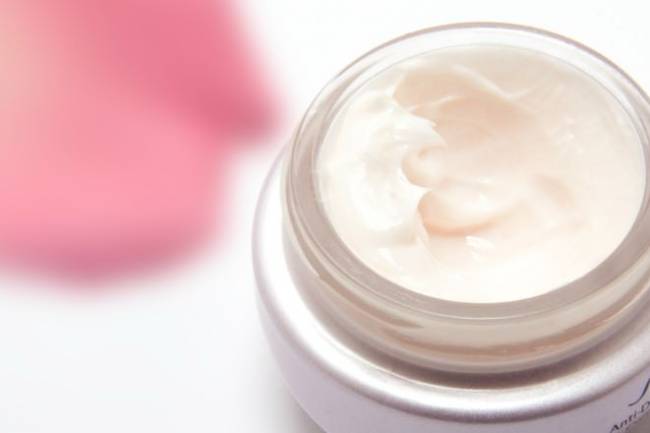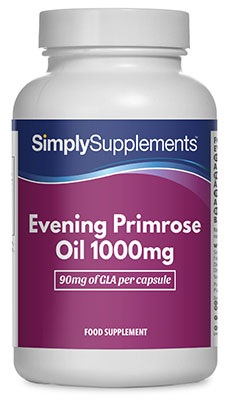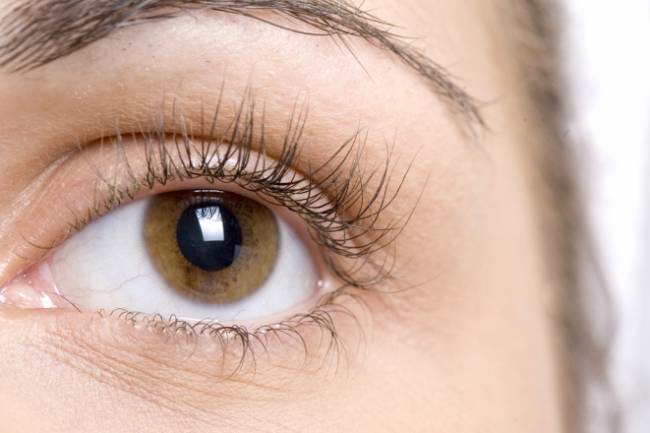Health Benefits of Evening Primrose Oil

Evening primrose oil benefits our health in many different ways thanks to its rich omega 6 content. The oil pressed from the seeds of the evening primrose plant is rich in a specific omega 6 fatty acid called gamma linolenic acid (GLA), which is thought to offer anti-inflammatory benefits for the heart and brain.
While beneficial for both men and women, the oil is popularly taken by women to stabilise hormonal imbalances. Discover how to take evening primrose oil to achieve the best results.
What is Evening Primrose Oil?
The evening primrose plant grows wild in North America and blooms bright yellow flowers in the evening, hence its name. The oil pressed from the seeds is one of the richest natural sources of an omega 6 fatty acid called gamma linolenic acid (GLA), which is responsible for the oil's health benefits. Traditionally, evening primrose oil was referred to as the ‘King’s cure-all’ due to its many healing properties.
The body converts the GLA in evening primrose oil into hormone-like substances called prostaglandins, which offer anti-inflammatory benefits and help to regulate hormones in the pituitary gland. GLA is also essential for cell structure, nerve function and the elasticity of the skin.
GLA is essential for the maintenance of good health but the body can’t make it, so it needs to be consumed through the diet. Several factors can interfere with the conversion process, such as the ageing process, alcoholism, poor nutrition, and health problems.
Evening Primrose Oil Benefits
Evening primrose oil benefits health in several ways and has been widely studied over the years. There is clinical evidence supporting its use for the following issues:
PMS: Many women find that evening primrose oil offers relief from common symptoms of premenstrual syndrome (PMS) and premenstrual dysphoric disorder (PMDD), particularly mood swings, breast tenderness and menstrual cramps. It is thought that GLA’s ability to regulate prostaglandins helps to reduce the body’s inflammatory response to hormone fluctuations that occur around menstruation. Many women who suffer from severe PMS, endometriosis, or PCOS are found to have low levels of GLA.
Infertility: GLA increases the production of cervical mucus and makes it thinner, which aids the mobility of sperm and promotes healthy reproduction. While evening primrose oil can be beneficial for fertility, it is not advised during later pregnancy, as it can stimulate the uterus walls to contract and induce labour.
Skin: Evening primrose oil has been shown to provide moderate improvements in the treatment of inflammatory skin conditions such as eczema, dermatitis, and acne. In several European countries, the oil is prescribed by doctors to treat these conditions. It is not yet fully understood how evening primrose oil benefits these conditions. Experts believe that evening primrose oil relieves acne by reducing sebum production and blocked pores. For eczema, it provides concentrated levels of GLA to people who struggle to convert dietary fats into GLA. One study involving 1207 patients with eczema found that evening primrose oil benefits eczema sufferers by relieving itching, crusting, edema, and redness.
Brain Function: There is promising evidence to show that evening primrose oil may help to reduce the risk of common brain disorders such as hyperactivity, attention deficit disorder (ADHD), depression, and schizophrenia. Prostaglandins act as chemical messengers in the brain and help to regulate nerve impulses, which are thought to support normal brain functioning, impulse control and concentration. One study involving ADHD patients found that taking a combination of omega 3 and 6 for four months significantly reduced symptoms when taken at dosages of 2-4 grams for children or 2-8 grams for adults.
Diabetes: Diabetics sometimes find that their body struggles to convert linoleic acid into GLA (the useable form) and so they are at greater risk of GLA deficiency. Supplementing with GLA may help to defend against diabetic neuropathy and possibly even reverse nerve damage in some cases. In one study, 100 adults with diabetic neuropathy were given 480mg of evening primrose oil daily for 1 year. Findings showed marked improvements in nerve generation, and symptoms such as tingling, numbness were less marked compared to the placebo.
Breast Pain: Evening primrose oil is sometimes used in the treatment of mastalgia (breast pain), particularly for cyclical mastalgia when women develop pain in the breasts just before menstruation. Many women who suffer from mastalgia are found to be low in omega 6 fatty acids, so supplementing with evening primrose oil throughout the month may help to balance levels and relieve pain. To date, the findings from clinical trials have been mixed, but it appears that a combination of 3000mg of evening primrose oil and 1200iu of vitamin E can reduce breast pain in some women when taken for at least four months.
How to Take Evening Primrose Oil
Evening primrose oil has been shown to be beneficial in doses of 3000mg to 4000mg daily, which can be divided into several doses throughout the day. When looking for a high-quality evening primrose oil product, the oil should be standardised to around 8% GLA. This means you will ideally be taking around 240mg to 320mg of GLA daily.
There are several different preparations of evening primrose oil available so it can be tricky deciding how to take evening primrose oil to best suit your needs. The oil can be applied topically to skin and hair, either neat or mixed with a moisturiser. It is easy to absorb and non-comodogenic so it won’t block the pores. In supplement form, you should take evening primrose oil with food to ensure good absorption into the body.
Due to the way evening primrose oil works, it is unlikely to provide instant relief. Instead, the oil should be taken for several months. If you are taking any prescription medications, check that they are safe to take in combination with evening primrose oil prior to supplementation.
Many experts advise pregnant women to avoid using evening primrose oil because the oil is believed to trigger uterine contractions and may induce labour. While some experts suggest that the oil is safe to take for at least 34 weeks into pregnancy, others recommend avoiding it all together.
Side Effects of Evening Primrose Oil
Evening primrose oil supplements have an excellent safety record when taken within the recommended guidelines. Minor side effects of evening primrose oil may include headaches, indigestion, nausea, or soft stools. The oil can also trigger an allergic reaction in some people; if you notice a rash, itching, or difficulty breathing discontinue use and consult with a healthcare professional.
Shop Evening Primrose Oil Capsules

 Nicole
Nicole 

























